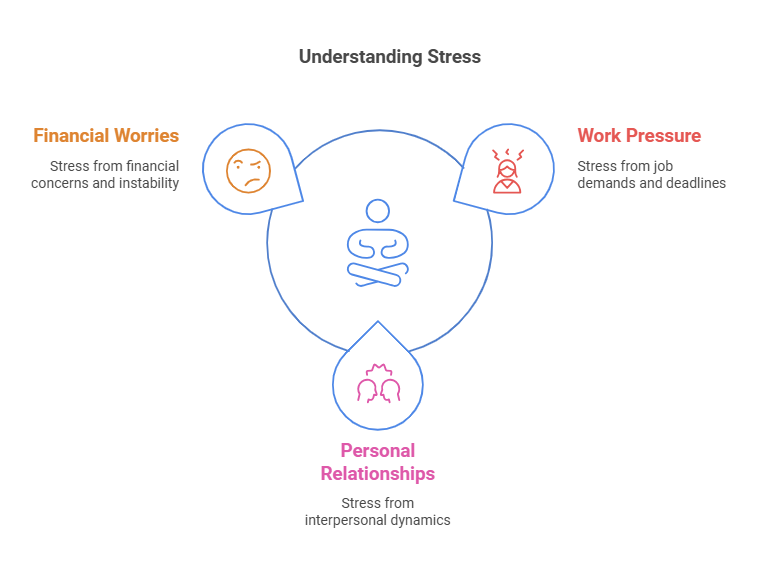Get real tips for managing stress that actually work. Learn how to reduce anxiety and feel better in both your mental and physical health.
Managing Stress Effectively
Stress. We all get it. Sometimes it creeps up on you slowly, like laundry piling up. Other times it hits you all at once, like when you realise it’s Monday… again. Whether it’s pressure at work, family stuff, or just too many tabs open in your brain, learning how to manage it in a healthy way can make all the difference.
In this guide, you’ll find real, down-to-earth ways to manage stress that actually fit into real life. We’ll look at how stress affects your mind and body, how to spot when it’s happening, and some everyday things that could be behind it. Whether it’s getting your body moving or just taking a few minutes to breathe, there are simple tricks that help ease the load both physically and emotionally.
You’ll also find ways to work stress relief into your daily routine without needing to book a yoga retreat or delete your entire life. From figuring out your own stress triggers to finding something that helps you actually feel better, small changes can go a long way.
Understanding Stress
What is stress?
Stress is what happens when life feels like a bit too much. Sometimes it’s caused by one major thing. Other times it’s just a bunch of little things stacking up until you feel like screaming into a pillow. You might notice your heart racing, your shoulders up near your ears, or your brain bouncing between a million thoughts. That’s your body saying, “Oi, something’s not right.”

A little bit of stress now and then can give you a push to get stuff done. But when it sticks around for too long, it drains you. You end up tired, grumpy, and not feeling like yourself. Once you know how stress shows up in your body and mind, it’s much easier to do something about it.
Common Causes of Stress
Stress can come from anywhere. Most often it’s things like:
- Work pressure — long hours, tight deadlines, or that never-ending inbox
- Relationship problems — with family, friends, or partners
- Money issues — bills, debt, or trying to make ends meet
- Health concerns — either your own or someone close to you
Stress might come from just one of these or from a mix. Noticing where your stress is coming from is the first step in figuring out how to deal with it.
The Impact of Stress on Health
When stress sticks around too long, it doesn’t just mess with your mood — it can start to affect your health too. You might feel constantly exhausted, easily annoyed, or just not quite right in yourself. Over time, all that stress can lead to bigger health problems, like:
- Heart disease
- High blood pressure
- Diabetes
- Anxiety
- Depression
Taking care of your mental health is just as important as looking after your physical health. Managing stress is one of the best ways to stay well — inside and out.
Recognizing Stress Symptoms
Physical Symptoms
Stress often shows up in your body before your brain catches on. You might notice:
- Headaches
- Feeling tired even after sleep
- Muscle aches or tightness
- Trouble sleeping
These are your body’s way of saying, “Time to slow down.” When you notice them, it’s a good moment to check in with yourself.
Emotional Symptoms
Your mood might shift too. You could feel:
- Easily irritated or angry
- Anxious or restless
- Moody or snappy
- Like everything is too much all at once
These emotional changes are red flags. Your brain is telling you it’s under pressure.
Behavioral Symptoms
Stress can also change how you behave. You might:
- Eat way more or way less than usual
- Avoid people you usually enjoy being around
- Turn to alcohol, smoking, or other habits more
- Drop out of your usual routines
These are signs stress is having an impact on your day-to-day. They’re reminders to take action before things build up even more.
Effective Stress Management Techniques
Mindfulness and Meditation
Mindfulness is just about paying attention to now. It helps pull your brain out of the worry spiral and into the moment. Meditation is a simple way to practise it. Here’s how to give it a go:
- Find a quiet spot to sit comfortably
- Breathe in and out slowly
- Notice your breath — if your mind wanders, gently bring it back

Even a few minutes a day can make a difference. The more you do it, the easier it gets.
Physical Activity
Moving your body is a great way to lower stress. It doesn’t need to be fancy or hard — just do something that gets you moving. Try things like:
- Going for a walk
- Stretching or light yoga
- Dancing around your kitchen
- Playing a sport
- Doing a quick home workout
Even 20 minutes a few times a week can lift your mood and help clear your head.
Time Management
When your schedule feels out of control, stress levels go up. A bit of planning helps you feel more on top of things. You could:
- Pick the top 2 or 3 things that must get done today
- Break big tasks into smaller, more manageable ones
- Use a planner or phone reminders to keep track
Taking charge of your time gives you more breathing room and helps reduce that “always behind” feeling.
Healthy Eating
Food gives your body and brain the energy they need to cope. Eating well helps keep your mood and energy steady. You don’t have to go on a diet — just focus on balance:
- Eat more fruit, vegetables, whole grains, and protein
- Stay hydrated with water
- Cut back on caffeine and sugary snacks
Even a few small swaps can make you feel more in control and more energized.
Seeking Support
You don’t need to deal with stress all by yourself. Talking to someone can help lighten the load. Try chatting with:
- A close friend or family member
- A support group or community worker
- A therapist or counsellor

Just getting things off your chest can help things feel more manageable. You’re not alone in this.
Creating a Stress Management Plan
Setting Goals
A simple plan can make managing stress less overwhelming. Start with goals that feel easy to reach, like:
- Taking 10 minutes a day for yourself
- Going for a walk a few times a week
- Drinking more water instead of that fourth coffee
Small steps still count. They give you something to work towards and make it easier to stay on track.
Identifying Triggers
Stress doesn’t always come from the same place. Keeping track helps you spot patterns. Try writing down:
- What happened before you felt stressed
- The time and place
- How you felt in the moment
Once you spot your stress triggers, you can start figuring out better ways to respond.
Developing Coping Strategies
We all have different ways of calming down. Make a list of the things that help you feel better. It could include:
- Deep breathing
- Listening to calming music
- Spending time outdoors
- Getting creative — drawing, painting, baking
- Taking a hot bath or shower
Keep that list somewhere handy. When stress hits, you’ll have go-to options ready.
Conclusion
Stress is something everyone experiences. Whether it’s daily stress from home or work, or situations that cause you stress, it adds up fast. You don’t need to change everything at once. Small actions like physical activity can help, eating well, or trying simple relaxation techniques. These are all healthy ways to manage stress and ease stress on the body and mind.
When stress builds up, it can affect your relationships and mood and even cause health conditions. Stress can contribute to anxiety and stress-related issues if you ignore the symptoms of stress. You may feel overwhelmed, tired, or unlike yourself. But learning ways to cope with stress can help reduce your stress response and lower your blood pressure.
If you feel stuck, talk to a mental health professional. They can help you manage stress with effective ways that work for your life. You can also check the Mayo Clinic Health System or National Institute of Mental Health for support.

